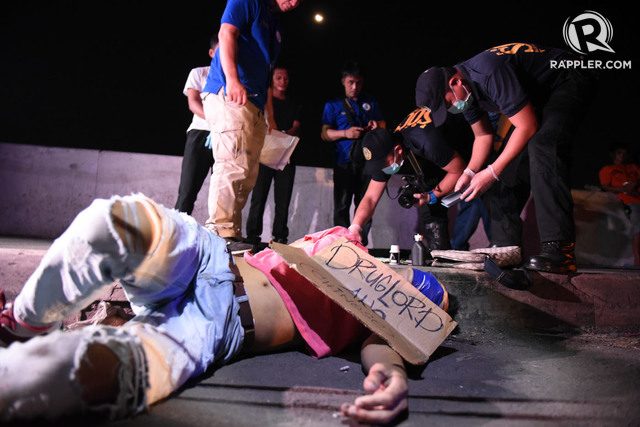SUMMARY
This is AI generated summarization, which may have errors. For context, always refer to the full article.

MANILA, Philippines – President Rodrigo Duterte will admit to, even boast of, the deaths of drug personalities in his administration’s brutal and bloody campaign against illegal drugs. But he also adamantly says these are not considered state-sponsored killings.
The Supreme Court (SC) disagrees.
“The government’s inclusion of these deaths among its other accomplishments may lead to the inference that these are state-sponsored killings,” the SC said in a resolution released on Tuesday, April 10.
In the resolution, the High Court denies Solicitor General Jose Calida’s motion for reconsideration of the SC order for government to provide full documentation of Oplan Tokhang. Despite Calida’s appeal that documents would risk national security, the SC is compelling the government to turn them over to the court.
The SC took judicial notice of the 2017 yearend report of the Duterte administration “where deaths in cases related to illegal drugs and the internal cleansing conducted within the Philippine National Police (PNP) are touted as accomplishments.”
According to the report, 3,967 drug personalities died in anti-drug operations from July 1, 2016, to November 27, 2017, while there are 16,355 homicide cases under investigation from July 1, 2016, to September 27, 2017.
“This is a total of 20,322 deaths during the Duterte administration’s anti-drug war from July 1, 2016 to November 27, 2017, or an average of 39.46 deaths every day,” the SC said.
It added: “This Court wants to know why so many deaths happened.”
This statement from the SC is in contrast to the committee report of Senator Richard Gordon which said neither Duterte nor the state sponsored the killings.
The government is now required to submit full documentation, including pre- and post-operation reports of the police, in all the deaths listed.
The SC said these documents would show whether or not the war on drugs is constitutional.
The main petition seeks to declare as unconstitutional the police and interior department circulars that operationalize the anti-drug campaign.
“In short, the faces of these police reports, both pre-operations and post-operations, would show whether the ‘application or operation’ of PNP CMC 16-2016, as well as of DILG’s MC 2017-112, was constitutional and in accordance with law and regulations,” the SC said.
The SC said Calida “willfully refused” to submit these documents when he filed a motion for reconsideration.
“If this Court cannot obtain the regularly-prepared information from the OSG as well as from the rest of the respondents, by what other means can ordinary citizens get information about their relatives who were killed during anti-drug operations of the police?” the SC said.
The SC en banc held 3 days of oral arguments on the main petition. (Read highlights here: Day 1 | Day 2 | Day 3)
The voting on the resolution was unanimous, except for the non-participation of Chief Justice Maria Lourdes Sereno and associate justices Estela Perlas Bernabe and Andres Reyes Jr, who were all on leave.
This is Calida’s first loss before the SC.
It also comes in the backdrop of a preliminary examination being conducted by the International Criminal Court into the high number of killings in the anti-drug campaign of the Duterte government.
– Rappler.com
Add a comment
How does this make you feel?
There are no comments yet. Add your comment to start the conversation.